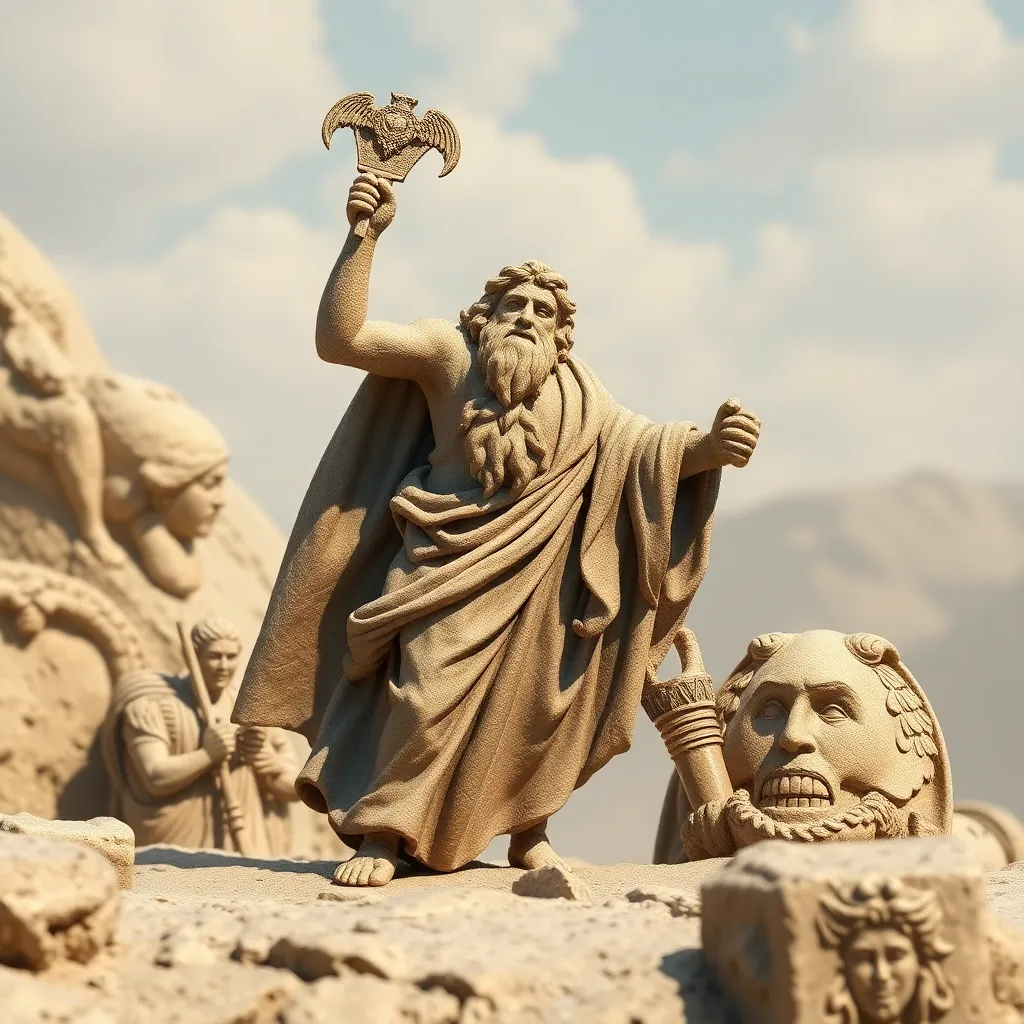The Cultural Impact of Odysseus in Ancient Greece
I. Introduction
Odysseus, the cunning hero of Homer’s epic poem “The Odyssey,” stands as one of the most significant figures in ancient Greek literature and culture. His journey home from the Trojan War is not just a tale of adventure but also a profound exploration of human experience, identity, and morality. “The Odyssey,” alongside “The Iliad,” forms a cornerstone of ancient Greek literature, showcasing the values, beliefs, and struggles of the time. This article aims to delve into the multifaceted cultural impact of Odysseus, exploring his role as an archetype of the hero, his influence on literature and art, and his lasting legacy in both ancient and modern contexts.
II. Odysseus as an Archetype of the Hero
In Greek mythology, the archetype of the hero embodies specific traits and qualities that resonate with audiences. Odysseus exemplifies this archetype through his intelligence, bravery, and resourcefulness. He is not just a warrior; rather, he is a thinker, often relying on his wits to overcome obstacles. His journey is one of growth, learning, and facing the complexities of human nature.
Some defining characteristics of Odysseus as a hero include:
- Cunning and Intelligence: Odysseus is known for his cleverness, as demonstrated by his famous ruse of the Trojan Horse.
- Bravery: He confronts numerous challenges, including mythical creatures and treacherous gods.
- Resilience: Despite facing countless trials, he remains determined to return home to Ithaca.
When compared to other Greek heroes, such as Achilles and Theseus, Odysseus stands out for his emphasis on intellect over brute strength. Achilles represents the archetype of the warrior, while Theseus showcases the hero as a problem-solver. Odysseus, however, merges both intellect and physical prowess, making him a more complex and relatable figure.
III. Influence on Greek Literature and Storytelling
The tales of Odysseus were primarily preserved through oral tradition, which played a crucial role in ancient Greek culture. Storytellers would recite his adventures, ensuring that his legacy endured across generations. This oral tradition not only kept the stories alive but also established a narrative framework that would influence countless works of literature.
Odysseus’ impact on later literature is significant:
- Virgil’s “Aeneid”: The character of Aeneas is directly influenced by Odysseus, reflecting the themes of heroism and the quest for home.
- Modern adaptations: Many contemporary novels and films draw inspiration from “The Odyssey,” exploring similar themes of adventure and self-discovery.
Moreover, Odysseus’ journey contributes to the development of narrative structure in literature. The use of flashbacks, nonlinear storytelling, and complex character development can all be traced back to the techniques employed in “The Odyssey.”
IV. Odysseus in Art and Iconography
The representation of Odysseus in ancient Greek art is abundant and varied. Pottery, sculpture, and frescoes often depict key moments from his adventures, illustrating not only the stories but also the cultural values of the time.
Key artworks depicting Odysseus include:
- The Return of Odysseus: Many vases illustrate his return to Ithaca and the subsequent battle with the suitors.
- Odysseus and the Cyclops: This iconic scene shows his cleverness in outsmarting the giant Polyphemus.
These artistic representations serve as a testament to the symbolism of Odysseus within visual culture, often embodying themes of resilience, cleverness, and the human spirit’s triumph over adversity.
V. Thematic Elements of Odysseus’ Journey
The journey of Odysseus is rich with thematic elements that resonate deeply within Greek values. Key themes include:
- Cunning vs. Strength: Odysseus often relies on his intellect to navigate challenges, suggesting that wisdom is as important as physical power.
- Nostos (Homecoming): The theme of returning home is central to the narrative, reflecting the Greek ideal of loyalty and family.
- Moral Dilemmas: Throughout his journey, Odysseus faces ethical challenges that test his character and decisions.
These themes not only illustrate the complexities of Odysseus as a character but also reflect the broader societal values and moral questions of ancient Greece.
VI. Odysseus and Greek Identity
Odysseus embodies many of the ideals that the ancient Greeks held dear. His journey reflects the values of perseverance, intelligence, and the importance of home and family. As a quintessential Greek hero, Odysseus serves as a model for personal and national identity.
His role in shaping Greek identity can be seen in several ways:
- Representation of Greek Values: Odysseus exemplifies virtues such as loyalty, cleverness, and resilience.
- National Identity: The stories of his adventures contribute to the collective memory of the Greek people, reinforcing shared cultural narratives.
- Reflection of the Greek Experience: His struggles and triumphs resonate with the historical experiences of the Greeks, particularly in times of war and upheaval.
VII. The Legacy of Odysseus in Modern Culture
The influence of Odysseus extends far beyond ancient Greece, permeating modern literature, film, and cultural discussions. His character has become a symbol of the hero’s journey, representing the complexities of human experience.
In contemporary culture, Odysseus manifests as:
- Literature and Media: Many authors and filmmakers draw upon his story, using it as a framework for exploring themes of adventure, self-discovery, and the struggle against adversity.
- Symbol of Heroism: Discussions surrounding heroism often reference Odysseus, especially in terms of moral ambiguity and the duality of human nature.
- Cultural Relevance: His journey continues to resonate with audiences, reflecting ongoing themes of identity, belonging, and the quest for meaning.
VIII. Conclusion
The cultural impact of Odysseus in ancient Greece is profound and multifaceted. As an archetype of the hero, he embodies the values and ideals of Greek society while influencing literature and art for centuries. His adventures continue to inspire modern narratives, highlighting the enduring legacy of his character and story.
Reflecting on the significance of Odysseus encourages a deeper understanding of ancient figures and their relevance in contemporary society. The exploration of his journey, values, and challenges offers timeless insights into the human experience, demonstrating why Odysseus remains a pivotal figure in both ancient and modern cultural contexts.




